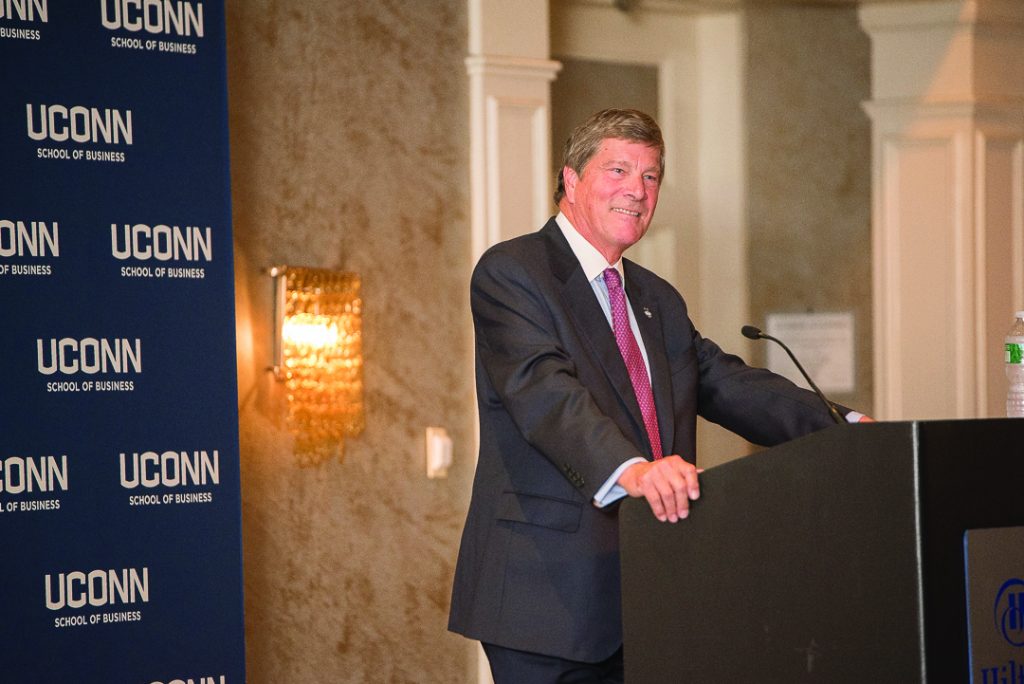UConn School of Business Celebrates 75th Anniversary, Alumni Consistently Amazed at How Their Program Has Grown


This year we are celebrating the 75th anniversary of the creation of the University of Connecticut School of Business. Our history is captured in the larger arc of the history of our time and in the lives of our faculty, students and alumni. Our story begins in 1941, as the storms of World War II threatened.
Gordon Tasker’s life is a classic UConn story. Gordon’s career was interrupted by the war. He survived the Pacific and returned to finish his degree in 1947, along with a flood of fellow veterans. The GI Bill helped a generation of veterans become college graduates, and UConn was an intellectual home for many veterans in the 1940s, 1950s, and it continues to be today. Gordon joined a small public accounting firm but went on to become a partner in the firm that is now PricewaterhouseCoopers (PwC). UConn grads played major roles in the growth of the accounting profession in Hartford, Stamford, New York City and Boston.
As a PwC partner, Gordon routinely crossed the Atlantic to serve a major client, Royal Dutch Shell. For many years he served in leadership roles at UConn, in the Foundation and ultimately as Chairman of the Board of Trustees in a leadership role that spread across the terms of three UConn presidents. Often he returned from London and immediately traveled to Hartford to meet with colleagues from Dartmouth who were advising UConn on the creation of our Health Center. Then, as now, higher education was characterized by “coopetition,” or cooperative competition, more than pure competition. Colleges work together to support continuous improvement and to create the strongest higher education experiences that we can. Our students and our communities deserve no less.
Laurence J. Ackerman was the founding dean and served with distinction from 1941 to 1963. He oversaw many changes, including the creation of an MBA program to serve returning veterans. Alumni remember him as warm and engaged. He knew many students well and counseled them effectively.
This personal touch exemplified many in UConn’s School of Business, something I have noted over my four years as School of Business dean. Dick Kochanek is an example of a faculty member whom many alumni know and admire. Our goal for the School of Business is to transform the lives of individuals and organizations, and Dick has exemplified that goal for some 43 years. After officially retiring in 2002, he spent the next 13 years in the classroom. Retired is the wrong descriptor for a man who continued to teach a thousand students a year. Many of his students are now accountants because of his inspirational teaching. More of them took to heart his lessons on how to make the most of each day, how to maximize their learning during college and how to be the best human being they could become.
All of higher education was challenged by the events of the Vietnam war, and UConn was no exception. Some people fled the draft and protested the war, while others signed up and went to Vietnam. In that era, our veterans returned to a different world than those who fought in WWII or than those who are returning today. But always our veterans have brought maturity and a focused purpose to our campus. This has served them well and advantaged their classmates.
For many decades, alumni recall UConn as almost a commuter school. Certainly on weekends the Storrs campus emptied. There was no food service on weekends, nor any other reason to stay. But that has changed. And UConn is not just centered in Storrs, anymore. The School of Business has major academic centers in Stamford, Hartford and Waterbury. For many students these were a starting point en route to a transfer to the Storrs campus to earn the ultimate degree. But for decades some students have earned their degree entirely at a regional campus, and this trend is accelerating today. In recent years, we have launched new majors on the regional campuses. In Stamford, UConn is committed to creating a residential program. In Hartford, UConn is in the midst of creating a major urban campus complex that will bring all of our undergraduate and graduate programs together in one dynamic, centrally located place.
As UConn President Susan Herbst says, athletics are the front porch of UConn. People come for the excitement and stay for the education. During my career, I spent 25 years at Cornell, 10 years at Baruch College in Manhattan and now four years at UConn. When I arrived at UConn I worried that athletics would rule the roost. Happily, I have found them to be an excellent partner. Indeed many student-athletes select the rigor of the School of Business knowing they will have a robust degree when their athletic careers are complete.
In 1995, Coach Geno Auriemma and the UConn Women’s Basketball Team had their first of many great, undefeated seasons and NCAA championships, shining a brighter light on UConn. The story, as told to me, has those athletic accomplishments as pivotal moments in the creation of the UConn 2000 commitment by the state. Thus began a pattern of support for the University that included Bioscience Connecticut, and most recently Next Generation Connecticut. A huge investment in our future has brightened that potential decade by decade. Our alumni from 40 years ago come back in a state of amazement. They marvel at the bustling campus, weekends filled with activity and learning and a physical plant that has been transformed. Learning facilities, dormitories, air conditioning; it is all new, and all good.
The School of Business has been a beneficiary of the commitment to excellence. In the 1990s, our faculty embraced an enhanced academic vision. In a close vote, the faculty launched a Ph.D. program and committed to support the scholars that it would attract. The fruit of that decision is visible today in young scholars studying for the Ph.D., in strong faculty attracted by the existence of the program and accomplished graduates finding great careers in prominent universities around the world.
In 2001, the new School of Business building opened across from Gampel Pavilion. The learning environment is state-of-the-art, and we continue to ensure that our capability keeps pace with rapid enhancements of technology. New graduate degree programs have included an online Master of Science in Accounting, which this year was named No. 2 in the nation by U.S. News and World Report among online masters programs in business. We have relied on our alumni and corporate friends in the design and launch of new master’s degrees in business analytics and project management and in financial risk management. Both were great ideas at the right time, and have far surpassed our expectations. Most recently we revamped a master’s in human resources, which is thriving.
In 1993, the School of Business Hall of Fame launched, and in the ensuing decades, more than 100 individuals have been inducted. Not surprisingly, Gordon Tasker ’47 was in the first group of inductees, along with Thomas Wolff ’56, Harry Gampel ’43, Edward Heberger ’58, Bob Cizik ’53 and several others. The Hall of Fame membership is a reminder of the leadership that our alumni continue to provide for the School and for UConn. It has been my privilege to come to know many of them, too many to name here. But I will call out a few other names that you will recognize because they grace buildings, conference rooms, classrooms and chairs at the University and in the School: Barton, Estes, Fox, Freitas, Friar, Gang, Gladstein, Lodewick, McCarthy, Nayden, Shenkman, Toscano and Treibick. And the support was not always from individuals. Strong corporate support has come from Aetna, Andersen Tax, Cigna, Cornerstone Real Estate Advisers LLC, Deloitte, GE Capital, GE, ING (now Voya), KPMG, Northeast Utilities (now Eversource), PwC, SS&C Technologies Inc., The Travelers, UTC, Xerox, and many more.
This welcome merely outlines and sets the stage for a celebration of 75 years of history. We welcome the opportunity to share these moments and highlights. Thank you for supporting UConn’s School of Business.
John A. Elliott
Dean